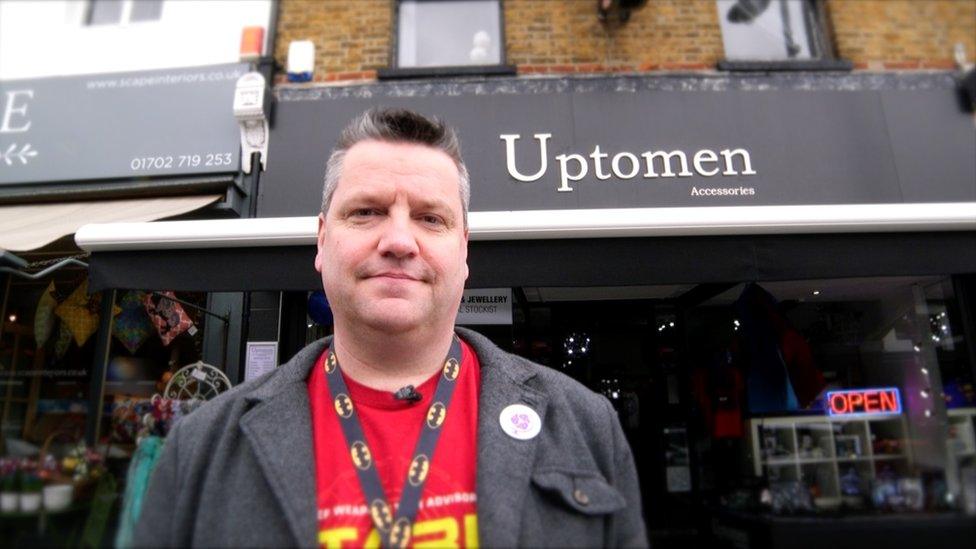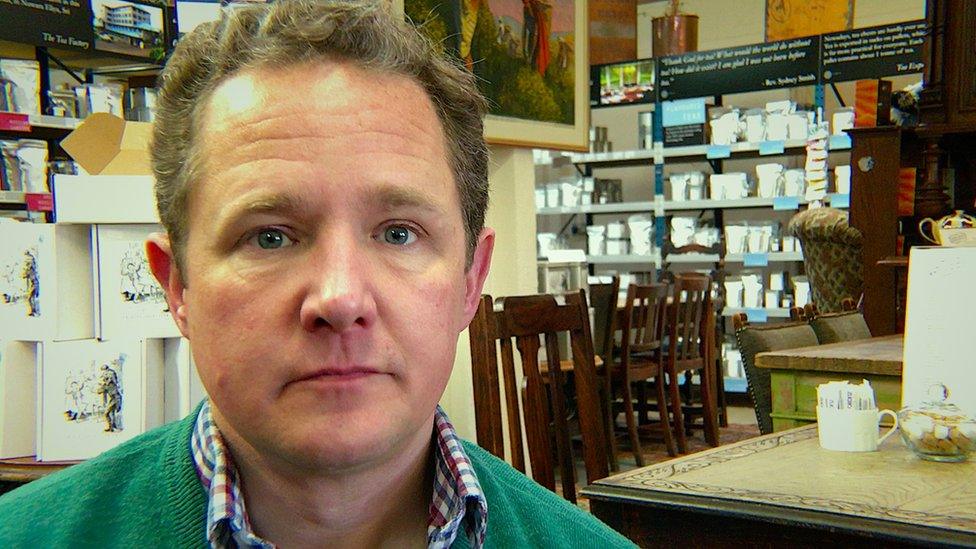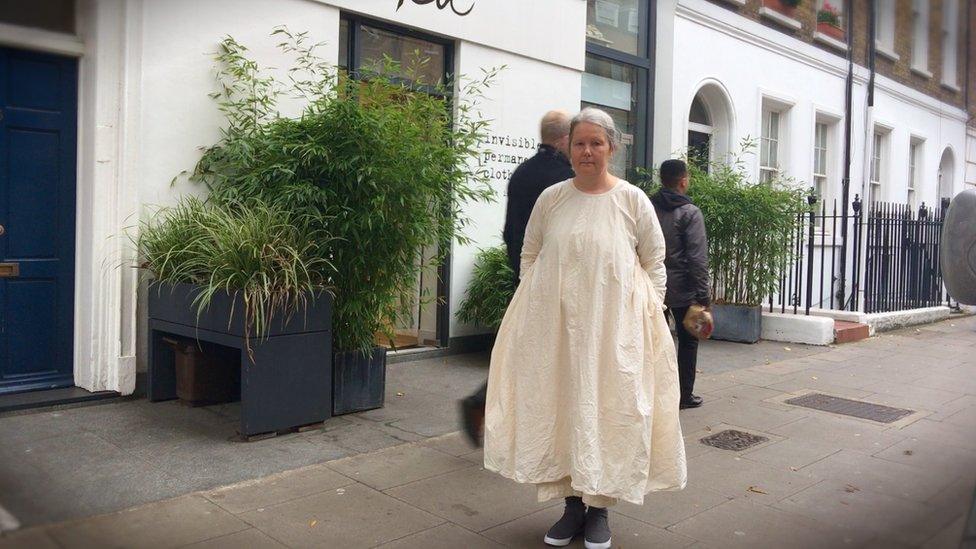My Shop: How business rates are hitting home
- Published

Which of these shopkeepers are the winners and losers with the business rate changes?
There is growing unease in the business community as it braces itself for England's first rate revaluation since 2010.
The government is promising help in the Budget, but critics are calling the rates system itself "unfit for purpose in the 21st century".
As the commercial rental value of business premises are brought up to date, there will inevitably be some big losers. (You can learn more about the process here.)
To get a snapshot 'rate reaction', we asked six shopkeepers we have previously profiled for our My Shop video series to reveal how they will be affected in April. Some are angry, some pleasantly surprised - and one thinks he knows a better way.

'How will I survive?'

Mike Wells runs his self-proclaimed "bloke's paradise" in Essex
"Trying to find the extra cash is going to be close to impossible," complains Mike Wells.
His shop Uptomen in Leigh-on-Sea is devoted to male products, from shaving foam to belt buckles. Surprisingly, it attracts a mainly female clientele, looking for gifts for the men in their lives.
He is one of the unlucky shopkeepers who will pay more when new business rates kick in. £1,000 more a year to be exact.
This is because the 'rateable value' of his shop, which he runs alone, has gone up £2,000 to £17,250.
"My own personal wage is way below minimum wage," he explains, "and has been at the same level for almost five years, just £4 per hour. How will I survive?"
"Landlords are generally a greedy bunch and whilst they are happy to raise rents when times are good, they (in my experience) never reduce them when times are hard."
"A tax based on a business's ability to pay would be much fairer…Oh yes, one of those already exists. Corporation tax."

'Pips are squeaking'

Former naval officer Andrew Gadsden runs All About Tea in Portsmouth
Spare a thought for tea-importer Andrew Gadsden in Portsmouth.
He made a Brexit bonus by stocking up on lots of tea in dollars before the referendum - but much of those savings will now be needed to pay his rates bill.
He is looking at a 44% rise, as the rateable value of his warehouse-cum-cafe goes up from £18,997 to £27,346.
"To stand still I must sell £20,000 more tea or reduce staffing - that's the reality," he says.
The high value of his large premises means that he has never qualified for any relief - which the government offers to small businesses in lower property bands.
"Effectively this [rate rise] will come out of my pocket, a pay cut for me."
"Mrs May says 'Britain is open for business'. Well the pips are squeaking."

Crates and rates

Catch Steve Everitt on the right day and you will find him dressed as his beloved Bilko
Not all our shopkeepers are losing out.
When he turned 50, Steve Everitt decided to follow his dream and build a Phil Silvers-themed memorabilia shop in Coventry.
In his first year of business, 2015, he was based in an old shipping container in the FarGo Village mall. He did all his paperwork and was pleased to find his crate generated zero rates.
However, when he graduated to a more conventional retail space in the mall last year he had to pay £565. It would have been free but retail relief was abolished that year, he recalls sadly.
The latest revaluation has returned his rates to zero for 2017.
In the new system business properties rated at up to £12,000 pay zero rates (the threshold used to be £6,000).
It's good news for a shop that runs on passion and niche marketing.

'I'm not sure it's fair'

Carin Mansfield's clothes take inspiration from centuries-old English worker styles
Clothes maker Carin Mansfield also benefits from the threshold change.
She makes 'new vintage', hand-made clothes that are expensive, but she says will last for 50 years - long enough to survive around seven business rate revaluations.
Her small shop IN-KU is near Warren Street in central London - but it's tiny and actually doesn't get a huge amount of footfall.
When it was rated back in 2010, her value was set at £6,500. She paid around £50 per month to Camden Council, she says.
Her new rateable value is £9,000. Despite the rise, she now doesn't have to pay anything.
"I am not sure if it is fair to use the square footage as a calculation [for business rates]," she says.
"IN-KU has very small square footage, but it works for my purpose."

'Don't complain'

Cheaper, larger commercial lets in the north have allowed Colin Shenton's business model to expand
Ziferblat is a small franchise of "pay per minute" cafes that are thriving since expanding outside of London, where commercial rents are cheaper.
In these innovative cafes, you can consume as much food, drink and wi-fi as you like - on the clock.
"The effect on us is neutral," explains owner Colin Shenton.
"Our rates in Manchester rise by 15%, in Liverpool it stays the same and in Leeds it drops by a third."
Having a geographical spread has protected them, as commercial property prices vary across the country.
"It must be fair that a small retailer in a market town pays less than a multinational on Bond Street," says Mr Shenton.
"Retailers should not complain," he reckons. "In theory, higher rents should mean higher turnover from their more desirable location."
What really matters is the multiplier that local councils apply to the valuations, he adds.

'If I won the lottery...'

Jon Sharky also plays in a progressive metal band at night on Liverpool's eclectic music scene
Jon Sharky's music t-shirt business in Liverpool's St. Quiggins centre is barely big enough to park a van in - in fact it doesn't even have solid walls.
He's chuffed that he's been nominated for 'Best New Business' at this year's Liverpool Retail Awards - alongside well-known names such as Victoria's Secret.
Though business-savvy, he is not entirely sure how his business rates have changed. His significant outgoings are streamlined into one payment he makes to the people who run the shopping mall. It's an arrangement he prefers.
"When I was researching potential sites for my business, the cheapest high street units I could find in the city centre started at more than seven times my current annual rent," he says.
And many of those units still lie empty, he points out.
"If it were up to me, every major city would have a building like ours, filled with small starter units, rented out to young independent entrepreneurs with all major bills included in the rent and then handled by the building owners.
"If I won the lottery, I'd do it myself!"
To see the video about Jon Sharkey's shop and all the others mentioned here, visit the My Shop page. The series by the BBC Business Unit focuses on distinctive, independent shops and is filmed on a smartphone. To suggest a shop email us, external. For the latest updates about the series follow video journalist Dougal Shaw on Twitter, external or Facebook, external.